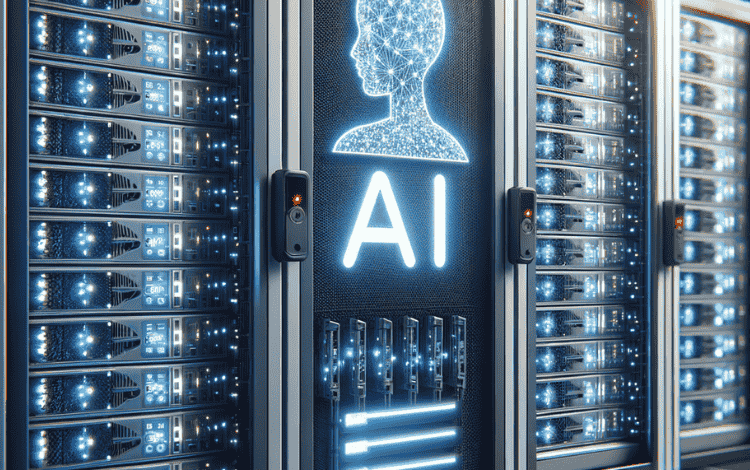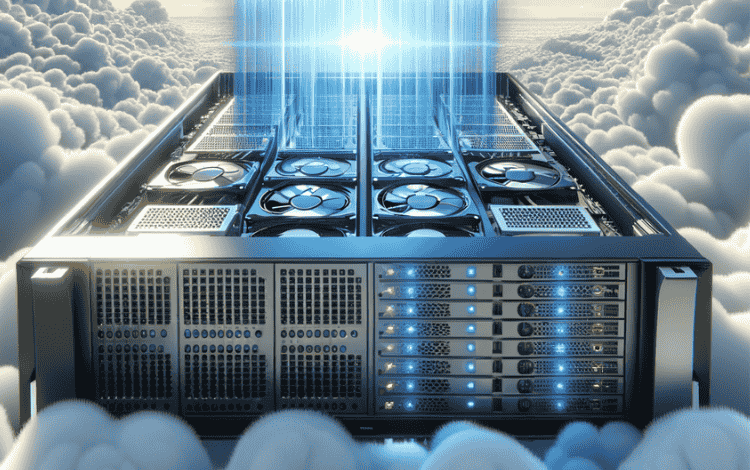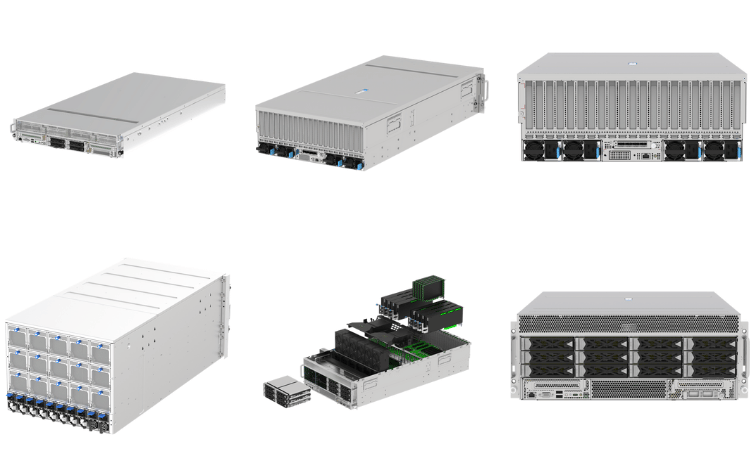AI Server Sales Will Grow: A Comprehensive Analysis
1. What does "AI Server Sales Will Grow" mean for the tech industry?
The phrase AI server sales will grow indicates a significant increase in demand for AI-optimized servers in the coming years. This growth is driven by the rapid adoption of technologies such as machine learning, deep learning, and AI inference. AI servers, equipped with specialized hardware like GPUs and TPUs, are essential for processing the large amounts of data that AI applications require. Analysts predict that the AI server market will experience a compound annual growth rate (CAGR) of 20-30% over the next five years. This surge is supported by industries such as healthcare, finance, and autonomous driving, which are increasingly leveraging AI to improve their services.

2. What are the main factors driving the growth in AI server sales?
Several factors contribute to the growth in AI server sales:
Increased AI adoption: More companies are incorporating AI into their operations, especially in data-heavy industries like healthcare, manufacturing, and finance.
AI inference demand: The rise in real-time AI applications like natural language processing (NLP) and computer vision necessitates powerful servers for AI inference.
Cloud computing: Providers like AWS, Google Cloud, and Azure are expanding their AI infrastructure, increasing the demand for AI servers.
Edge computing: AI-powered edge devices and applications require local servers that can handle inferencing tasks in real-time.
3. How does the AI bubble affect the server market?
There has been ongoing debate about whether there is an AI bubble or not. However, even if some aspects of AI may be overhyped, the demand for AI servers remains solid. AI servers are critical infrastructure, and even in a scenario where AI use cases are scaled back, the need for high-performance computing systems will persist. Companies that are heavily investing in AI, such as Tesla and Google, continue to demonstrate the long-term potential of AI-driven solutions. Thus, while there could be market corrections, server sales will still benefit from the broader technological advancements.
4. What is the significance of Venus Chub AI server status?
The Venus Chub AI server status is closely watched by industry analysts because it represents one of the largest AI server systems deployed for massive-scale AI workloads. Venus Chub is part of a broader AI infrastructure that supports advanced computing tasks such as AI model training and inference. Monitoring the status of such large-scale systems provides insight into the overall performance, reliability, and efficiency of cutting-edge AI servers. Companies and researchers often look at these benchmarks to assess how effectively AI servers can meet growing computational demands.
5. What is the current state of the AI inference server market?
The AI inference server market has seen robust growth due to the increasing demand for real-time AI applications. Inference servers are optimized to process pre-trained AI models, making them essential for industries like healthcare (for diagnostics), finance (for fraud detection), and retail (for personalized recommendations). According to market reports, the AI inference server market is expected to reach a valuation of $10 billion by 2026, driven by the growth of AI-powered applications and the need for faster, more efficient processing capabilities.
6. Who are the top AI server manufacturers?
Several companies lead the way as AI server manufacturers, including:
NVIDIA: Known for its powerful GPUs, NVIDIA is a dominant player in the AI server market.
Intel: Intel provides AI-optimized processors and is heavily investing in AI hardware through its Intel AI server products.
AMD: Offering competitive GPUs and CPUs, AMD is also expanding its AI server solutions.
Google: Through its Tensor Processing Units (TPUs), Google offers custom-built AI hardware, particularly for cloud deployments.
Dell and HPE: Both companies provide enterprise-grade AI servers designed to handle intensive AI workloads.

7. How does the AI server supply chain impact the market?
The AI server supply chain plays a critical role in meeting the growing demand for AI infrastructure. Disruptions in the supply chain, such as the global semiconductor shortage, have had direct impacts on the availability of AI servers. Manufacturers are working to stabilize the supply of key components like GPUs and AI-specific processors. Strong supply chain management is essential for companies like AI server manufacturers to stay competitive, ensuring that they can meet the increasing demand from industries adopting AI technologies.
8. What is the role of GPUs in AI server growth?
GPU AI server systems are pivotal to the growth of AI servers because GPUs are fundamentally designed for parallel processing, which is ideal for AI tasks. Tasks like neural network training, image recognition, and natural language processing are computationally intensive and benefit from the high throughput provided by GPUs. NVIDIA, AMD, and Intel have been investing heavily in GPU technologies to cater to the increasing demand for AI workloads. The shift toward GPU-heavy servers signifies a transformation in data center architectures, optimized specifically for AI.
9. Why are 2U AI servers gaining popularity?
2U AI server designs are becoming more popular due to their balance between space efficiency and performance. A 2U server provides more room for high-performance components like additional GPUs, memory, and storage compared to a 1U server, without taking up as much space as larger rack units. Many data centers are shifting to these configurations because they offer a good compromise between density and power, particularly for AI workloads that require both computational power and flexibility in configuration.
10. How does cloud computing influence AI server sales?
Cloud providers have been one of the largest drivers behind the growth in AI server sales. Companies like Amazon, Google, and Microsoft are continuously expanding their AI offerings, which require massive numbers of AI-optimized servers. Many organizations prefer cloud solutions because they offer scalability without the upfront capital expenditure required for on-premise AI server infrastructure. As cloud AI services continue to grow, the demand for AI servers in data centers also rises, creating a significant market for server manufacturers.
11. How are AI data servers different from traditional servers?
AI data servers are specifically designed to handle the intense computational workloads associated with AI, such as training large-scale machine learning models and performing AI inferences. Unlike traditional servers, which are optimized for general-purpose computing, AI data servers are typically equipped with high-performance GPUs, TPUs, or FPGAs. These components allow for faster data processing and significantly reduce the time required to complete complex AI computations. Moreover, AI data servers often come with specialized software stacks that optimize machine learning workflows.
12. What challenges do AI server manufacturers face?
AI server manufacturers face several challenges, including:
Component shortages: The ongoing semiconductor shortage has made it difficult to source key components for AI servers, such as GPUs and specialized AI processors.
Power and cooling: AI servers consume more power and generate more heat than traditional servers, requiring advanced cooling solutions.
Cost pressures: As AI becomes more widespread, manufacturers are under pressure to deliver cost-effective servers without compromising on performance.

13. How does AI server sales growth impact the data center industry?
The rise in AI server sales has significantly impacted the data center industry, driving demand for specialized infrastructure such as high-density racks, efficient cooling systems, and advanced networking solutions. Data centers now need to accommodate more power-hungry hardware like GPUs and TPUs, which requires careful planning around power distribution and cooling. Furthermore, the increase in AI workloads has led to the growth of hyperscale data centers, which are optimized for AI and high-performance computing tasks.
14. What role does AI inference play in AI server sales growth?
AI inference is one of the most critical drivers of AI server sales growth. Inference servers are used to deploy pre-trained models for real-time applications such as voice assistants, recommendation engines, and autonomous systems. These applications require servers that can handle fast, low-latency computations. As industries adopt more AI-based applications for real-time decision-making, the demand for inference servers will continue to rise, contributing to the overall growth in AI server sales.
15. Which industries are driving AI server sales?
Several industries are leading the demand for AI server sales, including:
Healthcare: AI is being used for diagnostics, drug discovery, and personalized medicine, all of which require powerful AI servers.
Finance: AI is critical for fraud detection, algorithmic trading, and risk management.
Retail: AI servers process large amounts of consumer data to provide personalized recommendations and improve supply chain efficiency.
Automotive: The development of autonomous vehicles relies heavily on AI servers for tasks such as image processing and decision-making in real-time.

16. What are the environmental considerations in AI server growth?
As AI server sales grow, there are increasing concerns about their environmental impact. AI servers consume a significant amount of power, and the cooling systems required to maintain their performance add to the energy demand. Companies are now exploring ways to reduce their environmental footprint by adopting energy-efficient hardware, utilizing renewable energy sources, and improving cooling technologies. Cloud providers like Google and Microsoft have committed to carbon neutrality, which includes optimizing their AI server infrastructure for energy efficiency.
17. How does AI server sales growth affect hardware innovation?
The rapid growth in AI server sales is pushing hardware manufacturers to innovate at an unprecedented pace. Companies like Intel are developing specialized AI processors that are optimized for tasks like deep learning and AI inference. These processors, such as the Intel AI server products, are designed to increase performance while minimizing power consumption. Additionally, innovations in GPUs, TPUs, and FPGAs are enabling faster AI computations, which in turn drives further demand for AI servers.
18. What role do AI server supply chains play in ensuring market stability?
A robust AI server supply chain is essential to meet the growing demand for AI infrastructure. Disruptions in the supply chain, such as component shortages or logistical challenges, can significantly impact the availability of AI servers. Manufacturers are increasingly focusing on diversifying their supply chains and securing access to critical components like semiconductors. Additionally, partnerships between server manufacturers and suppliers help ensure that production can keep pace with demand.
19. How will AI server sales grow in the next five years?
Experts predict that AI server sales will grow at a compound annual growth rate (CAGR) of 25-30% over the next five years. This growth will be driven primarily by the increasing adoption of AI across industries such as healthcare, finance, and retail. Additionally, advancements in AI hardware and the expansion of cloud computing will further fuel the demand for AI servers. By 2028, the global AI server market is expected to surpass $50 billion, reflecting the critical role AI will play in the future of technology.
20. How can companies ensure they are prepared for the growth of AI server demand?
To prepare for the growth in AI server sales, companies should invest in scalable AI infrastructure, secure partnerships with reliable AI server manufacturers, and stay updated on the latest advancements in AI hardware. Working with trusted suppliers like Shenzhen Xintongtai Technology ensures access to high-quality servers and components. Shenzhen Xintongtai Technology is a leading provider of AI servers and related components, offering a wide range of products in stock and providing excellent customer service. Their commitment to quality and reliability makes them an ideal partner for businesses looking to scale their AI capabilities.

By partnering with Shenzhen Xintongtai Technology, businesses can gain access to state-of-the-art GPU AI server, 2U AI server, and AI data server solutions to meet the growing demands of AI workloads. Shenzhen Xintongtai Technology offers a wide variety of AI servers and components in stock, ensuring prompt delivery and reliable service to support your AI infrastructure needs.
